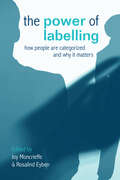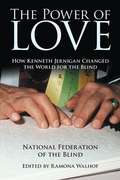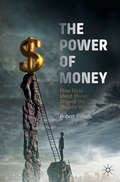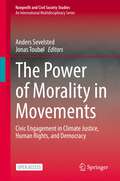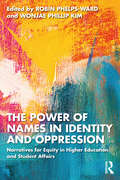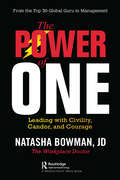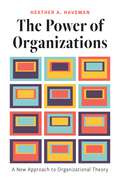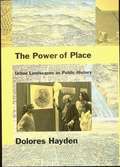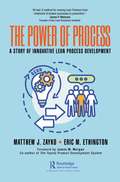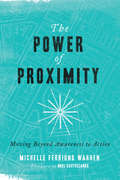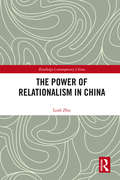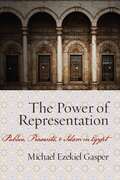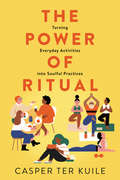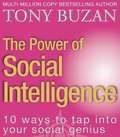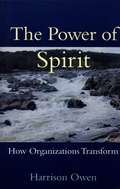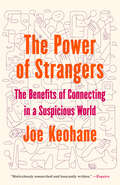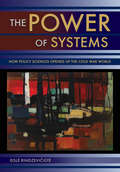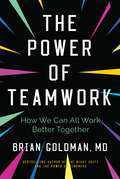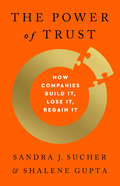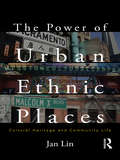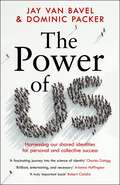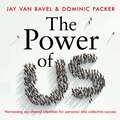- Table View
- List View
The Power of Labelling: How People are Categorized and Why It Matters
by Rosalind Eyben Joy MoncrieffeWhat does it mean to be part of the mass known as ?The Poor?? What visions are conjured up in our minds when someone is labelled ?Muslim?? What assumptions do we make about their needs, values and politics? How do we react individually and as a society? Who develops the labels, what power do they carry and how do such labels affect how people are treated? This timely book tackles the critical and controversial issue of how people are labelled and categorized, and how their problems are framed and dealt with. Drawing on vast international experience and current theory, the authors examine how labels are constituted and applied by a variety of actors, including development policy makers, practitioners and researchers. The book exposes the intense and complex politics involved in processes of labelling, and highlights how the outcomes of labelling can undermine stated development goals. Importantly, one of the book?s principal objectives is to suggest how policy makers and professionals can tackle negative forms of labelling and encourage processes of ?counter-labelling?, to enhance poverty reduction and human rights, and to tackle issues of race relations and global security. The Afterword encapsulates these ideas ands provides a good basis for reflection, further debate and action.
The Power of Love: How Kenneth Jernigan Changed the World for the Blind
by National Federation of the Blind<P>The Power of Love: How Kenneth Jernigan Changed the World for the Blind shares the voices of a collection of individuals whose writings reveal the deep truth that serves as the foundation for the life and work of Kenneth Jernigan. <P>His life and their writings together speak of how Thomas Jefferson's self-evident truths imply that equality extends to embrace blind people just as surely as this country has come to understand equality's inclusion of all people regardless of the color of their skin. <P>Ramona Walhof, editor of The Power of Love and longtime friend of Kenneth Jernigan, draws together the distinctive voices of individuals who knew Kenneth Jernigan and whose lives he touched through his work with the National Federation of the Blind. Each of the reflections begins with a brief biographical sketch that introduces the chapter's author and ties his or her life to Kenneth Jernigan and his work. <P>The book concludes with a chapter, "Blindness: The Federation at Fifty," a retrospective written by Kenneth Jernigan himself in the last decade of his life. The Power of Love: How Kenneth Jernigan Changed the World for the Blind gathers a polyphonic chorus of voices that tell how the power of love, coursing through the life of Kenneth Jernigan, changed the world for the blind and, in so doing, changed the world for everyone.
The Power of Market Fundamentalism
by Fred BlockWhat is it about free-market ideas that gives them staying power in the face of such failures as persistent unemployment, widening inequality, and financial crises? The Power of Market Fundamentalism extends economist Karl Polanyi's work to explain why these dangerous utopian ideas have become the dominant economic ideology of our time.
The Power of Money: How Ideas about Money Shaped the Modern World
by Robert PringleInnovation in money is just as important as innovation in any other sphere of activity; money is always a “work in progress.” In fact, history shows societies have tried out a wide diversity of monetary arrangements. Ideas about money have played key roles at crucial turning points in world history and during national histories. Recently, a new global money space has been created, a joint venture between the public and private sector. This book explores the new money society that has grown up to inhabit this new space. The book has several aims: Firstly, the book shows how beliefs about money, as well as attitudes and values towards it, have varied between societies and over time, and specifically how they have changed over the modern era. Secondly, the book shows the powerful effects that changing ideas have had on events, including wars and revolutions, recessions, booms and financial crises. Thirdly, the book recounts the creation of a global money space, dated to the last quarter of the 20th century, and explores its features. Fourthly, the book describes some characteristics of the new money society that inhabits the global money space. Fifthly, the book shows how each society, and indeed successive generations of the same society, has made its own unique arrangements to govern money – i.e. how it comes to terms with the power of money. The author argues that we need to develop a new arrangement now and suggests that we have much to learn from recent creative work in a number of fields ranging from the sociology of money to contemporary art. This approach sheds new light on a number of controversial issues, including the rise of crony capitalism, growing social divisions, currency wars, and asset price bubbles.
The Power of Morality in Movements: Civic Engagement in Climate Justice, Human Rights, and Democracy (Nonprofit and Civil Society Studies)
by Anders Sevelsted Jonas ToubølThis Open Access book explores the role of morality in social movements. Morality has always been central to social movements whether it be in the form of the moral foundations of movement claims, politics and ideologies, the values motivating participation, the new moral principles envisioned and practiced among movement participants, or the overall struggle over society’s moral values that movements engage in. This is evident in movements emerging from recent interlinked crises: the crisis of human rights, the climate crisis, and the developing crisis of democracy. In analyzing these current events through a variety of theoretical, methodological, and empirical lenses, this book brings morality to the forefront of the discussion, allowing for a rethinking of its role.The book is divided into five parts. The first part introduces and explores the central concept of the book, outlining the dominant existing approaches to morality and ethics in the extant movement and civil society literature. The following three parts investigate morality in relation to topics and movements that are either prominent to contemporary politics or salient to the question of morality. In these empirically informed parts, the authors apply a diverse selection of methods spanning fieldwork, historiography, traditional and novel statistical analytical methods, and big data analysis to a diverse selection of data. Topics discussed include refugee solidarity movements, male privilege and anti-feminism movement, environmental and climate justice movements, and religious activism. The fifth and closing part of the book focuses on the more abstract theoretical question of the relationship between morality and ethics and activist practices and points to future research agendas. This book will be of general interest to students, scholars and academics within the disciplines of political sociology, -science and -anthropology and of particular interest to academics in the subfields of social movement and civil society studies.
The Power of Names in Identity and Oppression: Narratives for Equity in Higher Education and Student Affairs
by Robin Phelps-Ward Wonjae Phillip KimStories and personal narratives are powerful tools for engaging in self-reflection and application of critical theory in higher educational contexts. This edited text centers "name stories" as a vehicle to promote readers’ understanding of social identity, oppression, and intersectionality in a variety of educational contexts from residence halls and classrooms to faculty development workshops and executive leadership board rooms. The contributors in this volume reveal how names may serve as entry points through which to foster learning and facilitate conversations about identity, power, privilege, and systems of oppression. Through an intersectional perspective, chapter authors reveal interlocking systems of oppression in education while also providing recommendations, lessons learned, reflection questions, and calls to action for those working to transform and advance equity-minded campus climates. This unique volume is for educators at colleges and universities doing equity work, seeking ways to initiate, facilitate, and maintain rich conversations about identity.
The Power of One: Leading with Civility, Candor, and Courage
by Natasha BowmanPraise for the Power of One. Every leader is focused on how to embrace the significant shifts happening in the workplace and in society at large, which are impacting the future of work and the way we connect. The challenge is to find the best path forward. The key to understanding how to tap into your own individual power and influence is through Natasha’s framework: civility, candor, courage, and consciousness. One person CAN make a difference in all aspects of their life, and Natasha provides a helpful guide, through powerful examples, to show you the path to embracing your incredible Power of One. Marla Kaplowitz, 4A’s, President & CEO The Power of One: Leading with Civility, Candor, and Courage is a journey of personal power and intentional influence. A better world, workplace, and community begins with you. You are the "it" factor. You have the power to use your everyday words and actions to influence extraordinary change in the workplace and beyond. It only takes ONE to make a difference. COVID-19, #MeToo, George Floyd—the events and movements of recent years have left us all with a hunger for positive change in every aspect of our lives. Yet most of us think we’re powerless to affect change. This book was written to combat that lie. Within these pages, you’ll find out the truth about who you are, what you have to offer, and how you can cultivate the power within you to create a new, positive dynamic in your home, office, neighborhood, and the world. Through powerful storytelling, Natasha Bowman provides meaningful and practical examples of how to build a life marked by civility, candor, and courage, as well as how to lead and develop cultures in which those virtues are on full display. You’ll learn how to shape power dynamics that are inclusive and diverse as you become an advocate for true equity. Most importantly, you’ll discover how to change lives for the better—starting with your own. Natasha Bowman is an expert in workplace equity and is recognized as a 2020 Top 30 Global Guru for Management. With her consulting firm, Performance ReNEW, she works with high-profile companies and organizations to gear them up for inclusive success in today’s diverse and demanding world.
The Power of Organizations: A New Approach to Organizational Theory
by Heather A. HavemanHow organizations developed in history, how they operate, and how research on them has evolvedOrganizations are all around us: government agencies, multinational corporations, social-movement organizations, religious congregations, scientific bodies, sports teams, and more. Immensely powerful, they shape all social, economic, political, and cultural life, and are critical for the planning and coordination of every activity from manufacturing cardboard boxes to synthesizing new drugs and reducing greenhouse gas emissions. To understand our world, we must understand organizations. The Power of Organizations defines the features of organizations, examines how they operate, traces their rise over the course of a millennium, and explains how research on organizations has evolved from the mid-nineteenth century to today.Heather Haveman shows how almost all contemporary research on organizations fits into three general perspectives: demographic, relational, and cultural. She offers constructive criticism of existing research, showing how it can be remade to be both more interesting and influential. She examines how we can use existing theories to understand the changes wrought by digital technologies, and she argues that organizational scholars can and should alter the impact that organizations have on society, particularly societal and global inequality, formal politics, and environmental degradation.The Power of Organizations demonstrates the benefits and dangers of these ubiquitous foundations of modern society.
The Power of Parasites: Malaria as (un)conscious strategy
by Dalia IskanderThis book describes how malaria both frustrates and facilitates life for Indigenous Pälawan communities living in the forested foothills of the municipality of Bataraza on the island of Palawan in the Philippines. Tracing the arc of malaria on the archipelago from colonial encounters to the present day, it examines the ways in which malaria parasites have become entangled in contemporary lives. It uniquely explores the experiences of local government leaders working towards sustainably developing this last ecological frontier, health workers trying to meet international targets to eliminate malaria, and Pälawan people trying to keep their bodies, social relations and the cosmos in careful balance. In exquisite detail, Dr Dalia Iskander shows how malaria emerged from, and was intrinsic to, a whole host of strategically-orientated social practices that were enacted in as well as around the disease’s name, as people worked day-to-day to gain power in different guises in different arenas.
The Power of Place: Urban Landscapes as Public History
by Dolores HaydenBased on her extensive experience in the urban communities of Los Angeles, historian and architect Dolores Hayden proposes new perspectives on gender, race, and ethnicity to broaden the practice of public history and public art, enlarge urban preservation, and reorient the writing of urban history to spatial struggles. <P><P>In the first part of The Power of Place, Hayden outlines the elements of a social history of urban space to connect people's lives and livelihoods to the urban landscape as it changes over time. She then explores how communities and professionals can tap the power of historic urban landscapes to nurture public memory. <P><P>The second part documents a decade of research and practice by The Power of Place, a nonprofit organization Hayden founded in downtown Los Angeles. Through public meetings, walking tours, artists's books, and permanent public sculpture, as well as architectural preservation, teams of historians, designers, planners, and artists worked together to understand, preserve, and commemorate urban landscape history as African American, Latina, and Asian American families have experienced it. <P><P>One project celebrates the urban homestead of Biddy Mason, an African American ex-slave and midwife active betwen 1856 and 1891. Another reinterprets the Embassy Theater where Rose Pesotta, Luisa Moreno, and Josefina Fierro de Bright organized Latina dressmakers and cannery workers in the 1930s and 1940s. A third chapter tells the story of a historic district where Japanese American family businesses flourished from the 1890s to the 1940s. Each project deals with bitter memories—slavery, repatriation, internment—but shows how citizens survived and persevered to build an urban life for themselves, their families, and their communities. <P><P>Drawing on many similar efforts around the United States, from New York to Charleston, Seattle to Cincinnati, Hayden finds a broad new movement across urban preservation, public history, and public art to accept American diversity at the heart of the vernacular urban landscape. She provides dozens of models for creative urban history projects in cities and towns across the country.
The Power of Process: A Story of Innovative Lean Process Development
by Matthew J. Zayko Eric M. EthingtonLean Process Creation teaches the specific frames—the 6CON model—to look through to properly design any new process while optimizing the value-creating resources. The framing is applicable to create any process that involves people, technology, or equipment—whether the application is in manufacturing, healthcare, services, retail, or other industries. If you have a process, this approach will help. The result is 30% to 50% improvement in first-time quality, customer lead time, capital efficiency, labor productivity, and floorspace that could add up to millions of dollars saved per year. More important, it will increase both employee and customer satisfaction. The book details a case study from a manufacturing standpoint, starting with a tangible example to reinforce the 6CON model. This is the first book written from this viewpoint—connecting a realistic transformation with the detailed technical challenges, as well as the engagement of the stakeholders, each with their own bias. Key points and must-do actions are sprinkled throughout the case study to reinforce learning from the specific to the general. In this study, an empowered working team is charged with developing a new production line for a critical new product. As the story unfolds, they create an improved process that saves $5.6 million (10x payback on upfront resource investment) over the short life cycle of the product, as well as other measurable benefits in quality, ergonomics, and delivery. To an even greater benefit, they establish a new way of working that can be applied to all future process creation activities. Some organizations have tried their version of Lean process design following a formula or cookie-cutter approach. But true Lean process design goes well beyond forcing concepts and slogans into every situation. It is purposeful, scientific, and adaptable because every situation starts with a unique current state. In addition, Lean process design must include both the technical and social aspects, as they are essential to sustaining and improving any system. Observing the recurring problem of reworking processes that were newly launched brought the authors to the conclusion that a practical book focused on introducing the critical frames of Lean process creation was needed. This book enables readers to consider the details within each frame that must be addressed to create a Lean process. No slogans, no absolutes. Real thinking is required. This type of thinking is best learned from an example, so the authors provide this case study to demonstrate the thinking that should be applied to any process. High volume or low, simple or complex mix, manufacturing or service/transactional—the framing and thinking works. Along with the thinking, readers are enabled to derive their own future states. This is demonstrated in the story that surrounds the case study.
The Power of Proximity: Moving Beyond Awareness to Action
by Michelle Ferrigno Warren Noel CastellanosWe can see evidence of injustice all around us, whether in continuing incidents of racial inequality or in the systemic forces that disenfranchise people and perpetuate poverty. It's important to learn about the world's inequities and to be a voice for the voiceless any way we can. But in an age of hashtag and armchair activism, merely raising awareness about injustice is not enough. Michelle Warren knows what is needed. She and her family have chosen to live in communities where they are "proximate to the pain of the poor." This makes all the difference in facing and overcoming injustice. When we build relationships where we live, we discover the complexities of standing with the vulnerable and the commitment needed for long-term change. Proximity changes our perspective, compels our response, and keeps us committed to the journey of pursuing justice for all. Move beyond awareness and experience the power of proximity.
The Power of Relationalism in China (Routledge Contemporary China Series)
by Leah ZhuIn the 21st century, China has become impossible to ignore. At the same time, a vast array of perceptions and judgments of China’s actions and future have arisen. The confusion, Leah Zhu postulates, is explained by decades of traditional modus operandi, which began in the Maoist Era and misconceives China as a ‘collectivist’ culture. This book, however, seeks to re-explore thousands of years of China’s history to demonstrate the country’s adherence to an alternative principle, ‘relationalism’. Tracing the pervasive power of ‘relationalism’ before and after Maoism, it examines the major aspects of Chinese culture, including politics, sociology, psychology and diplomacy. In doing so, it reveals the power of ‘relationalism’ as the core frame of reference behind contemporary Chinese beliefs and practices. Furthermore, armed with this newly established framework, this book ultimately provides a helpful analysis of China’s past political, economic, and judiciary reforms and of how they are faring under the control of the current regime. Featuring extensive evidence and analysis of Chinese culture from ancient rites through to the 21st century, this book will be invaluable to students and scholars of Chinese culture, politics and society. It will also appeal to social scientists and sociologists more broadly.
The Power of Representation
by Michael Ezekiel GasperGasper (history, Yale U. ) traces Egyptian national identity formation from the mid-1870s through the 1910s as a social and political project largely carried out by urban, literate elites. He argues that a good part of this project revolved around changing both the self-conception of the urban intellegentsia and their literary representations of the Egyptian peasantry, placing the peasantry within discourses of reform and nation that valorized their permanence and ceased to draw dividing lines between urban and rural in defining the nation, yet simultaneously placed the urban intelligentsia in the position of being the only legitimate voice of reform on behalf of the peasantry. He places this process within the context of the expansion of commodity production in Egypt and the pivotal impact of Islamic modernism as an ideology of mass mobilization. Annotation ©2009 Book News, Inc. , Portland, OR (booknews. com)
The Power of Ritual: Turning Everyday Activities into Soulful Practices
by Casper ter KuileCasper ter Kuile, a Harvard Divinity School fellow and cohost of the popular Harry Potter and the Sacred Text podcast, explores how we can nourish our souls by transforming common, everyday practices—yoga, reading, walking the dog—into sacred rituals that can heal our crisis of social isolation and struggle to find purpose—a message we need more than ever for our spiritual and emotional well-being in the age of COVID-19.“After half a decade of research and hundreds of conversations with people around the country, I am convinced we are in the midst of a paradigm shift. That what used to hold us in community no longer works, and that the spiritual offerings of yesteryear no longer help us thrive.”–Casper ter KuileWhat do Soul Cycle, gratitude journals, and tech breaks have in common? For ter Kuile they offer rituals that create the foundation for our modern spiritual lives. We are in crisis today. Our modern technological society has left too many of us—no matter our ages—feeling isolated and bereft of purpose. Previous frameworks for building community and finding meaning no longer support us. Yet ter Kuile reveals a hopeful new message: we might not be religious, but that doesn’t mean we are any less spiritual. Instead, we are in the midst of a paradigm shift in which we seek belonging and meaning in secular practices. Today, we find connection in:CrossFit and SoulCycle, which offer a sense of belonging rooted in accountability and support much like church groupsHarry Potter and other beloved books that offer universal lessons Gratitude journals, which have replaced traditional prayer Tech breaks, which provide mindful moments of calm In The Power of Ritual, ter Kuile invites us to deepen these ordinary practices as intentional rituals that nurture connection and wellbeing. With wisdom and endearing wit, ter Kuile’s call for ritual is ultimately a call to heal our loss of connection to ourselves, to others, and to our spiritual identities.The Power of Ritual reminds us that what we already do every day matters—and has the potential to become a powerful experience of reflection, sanctuary, and meaning.
The Power of Social Intelligence
by Tony BuzanPresents ways to develop skills to enable one to feel comfortable in social situations.
The Power of Spirit: How Organizations Transform
by Harrison OwenOne of the leading pioneers in the field of organizational change argues that real transformation does not result from corporate mandate but from the expression of the spirit and passion of the people in the organization. He suggests ways to release this spirit and dissipate the "Soul Pollution" -- apathy, stress, and exhaustion -- that plagues today's workforce.
The Power of Sports: Media and Spectacle in American Culture (Postmillennial Pop #23)
by Michael SerazioA provocative, must-read investigation that both appreciates the importance of—and punctures the hype around—big-time contemporary American athleticsIn an increasingly secular, fragmented, and distracted culture, nothing brings Americans together quite like sports. On Sundays in September, more families worship at the altar of the NFL than at any church. This appeal, which cuts across all demographic and ideological lines, makes sports perhaps the last unifying mass ritual of our era, with huge numbers of people all focused on the same thing at the same moment. That timeless, live quality—impervious to DVR, evoking ancient religious rites—makes sports very powerful, and very lucrative. And the media spectacle around them is only getting bigger, brighter, and noisier—from hot take journalism formats to the creeping infestation of advertising to social media celebrity schemes.More importantly, sports are sold as an oasis of community to a nation deeply divided: They are escapist, apolitical, the only tie that binds. In fact, precisely because they appear allegedly “above politics,” sports are able to smuggle potent messages about inequality, patriotism, labor, and race to massive audiences. And as the wider culture works through shifting gender roles and masculine power, those anxieties are also found in the experiences of female sports journalists, athletes, and fans, and through the coverage of violence by and against male bodies. Sports, rather than being the one thing everyone can agree on, perfectly encapsulate the roiling tensions of modern American life.Michael Serazio maps and critiques the cultural production of today’s lucrative, ubiquitous sports landscape. Through dozens of in-depth interviews with leaders in sports media and journalism, as well as in the business and marketing of sports, The Power of Sports goes behind the scenes and tells a story of technological disruption, commercial greed, economic disparity, military hawkishness, and ideals of manhood. In the end, despite what our myths of escapism suggest, Serazio holds up a mirror to sports and reveals the lived realities of the nation staring back at us.
The Power of Strangers: The Benefits of Connecting in a Suspicious World
by Joe KeohaneAn entertaining, surprising, and ultimately inspiring look at what happens when we talk to strangers, and why it affects everything from our own health and well-being to the rise and fall of nations in the tradition of Susan Cain&’s Quiet and Yuval Noah Harari&’s Sapiens&“This lively, searching work makes the case that welcoming &‘others&’ isn&’t just the bedrock of civilization, it&’s the surest path to the best of what life has to offer.&”—Ayad Akhtar, Pulitzer Prize–winning author of Homeland ElegiesIn our cities, we stand in silence at the pharmacy and in check-out lines at the grocery store, distracted by our phones, barely acknowledging one another, even as rates of loneliness skyrocket. Online, we retreat into ideological silos reinforced by algorithms designed to serve us only familiar ideas and like-minded users. In our politics, we are increasingly consumed by a fear of people we&’ve never met. But what if strangers—so often blamed for our most pressing political, social, and personal problems—are actually the solution?In The Power of Strangers, Joe Keohane sets out on a journey to discover what happens when we bridge the distance between us and people we don&’t know. He learns that while we&’re wired to sometimes fear, distrust, and even hate strangers, people and societies that have learned to connect with strangers benefit immensely. Digging into a growing body of cutting-edge research on the surprising social and psychological benefits that come from talking to strangers, Keohane finds that even passing interactions can enhance empathy, happiness, and cognitive development, ease loneliness and isolation, and root us in the world, deepening our sense of belonging. And all the while, Keohane gathers practical tips from experts on how to talk to strangers, and tries them out himself in the wild, to awkward, entertaining, and frequently poignant effect.Warm, witty, erudite, and profound, equal parts sweeping history and self-help journey, this deeply researched book will inspire readers to see everything—from major geopolitical shifts to trips to the corner store—in an entirely new light, showing them that talking to strangers isn&’t just a way to live; it&’s a way to survive.
The Power of Systems: How Policy Sciences Opened Up the Cold War World (Cornell Studies In Classical Philology Ser.)
by Egle RindzeviciuteIn The Power of Systems, Egle Rindzeviciute introduces readers to one of the best-kept secrets of the Cold War: the International Institute of Applied Systems Analysis, an international think tank established by the U.S. and Soviet governments to advance scientific collaboration. From 1972 until the late 1980s IIASA in Austria was one of the very few permanent platforms where policy scientists from both sides of the Cold War divide could work together to articulate and solve world problems. This think tank was a rare zone of freedom, communication, and negotiation, where leading Soviet scientists could try out their innovative ideas, benefit from access to Western literature, and develop social networks, thus paving the way for some of the key science and policy breakthroughs of the twentieth century.Ambitious diplomatic, scientific, and organizational strategies were employed to make this arena for cooperation work for global change. Under the umbrella of the systems approach, East-West scientists co-produced computer simulations of the long-term world future and the anthropogenic impact on the environment, using global modeling to explore the possible effects of climate change and nuclear winter. Their concern with global issues also became a vehicle for transformation inside the Soviet Union. The book shows how computer modeling, cybernetics, and the systems approach challenged Soviet governance by undermining the linear notions of control on which Soviet governance was based and creating new objects and techniques of government.
The Power of Teamwork: How We Can All Work Better Together
by Dr. Brian GoldmanNew from the bestselling author of The Power Kindness and host of CBC Radio’s White Coat, Black ArtIn the high-pressure and complex setting of healthcare, a new approach to teamwork is leading to healthier patients, happier staff and more efficient operations. Healthcare’s embrace of a new teamwork model has been noticed by people outside the medical world, so doctors are going outside the walls of the hospital to teach manufacturers, business owners, franchisees, customer service representatives and even those in sports and entertainment to do better by shifting the culture from “me” to “we.” Drawing on groundbreaking research and examples from around the world, The Power of Teamwork shows how a team approach to medicine can improve customer service and help women break the glass ceiling. It can solidify the provision of social services to troubled youth, and boost the efficiency and safety of the military and critical industrial complexes like nuclear power plants. It can even make professional sports teams perform better.
The Power of Trust: How Companies Build It, Lose It, Regain It
by Sandra J. Sucher Shalene GuptaA ground-breaking exploration of the changing nature of trust and how to bridge the gap from where you are to where you need to be. Trust, at every level of business and society, has never mattered so much and at the same time. CEOs, managers, presidents, governors - leaders at every level and in every institution - face vexing issues and trade-offs. Many flounder, especially in a turbulent era when confronted with multiple crises and constituencies demanding change. How to bridge these gaps requires a new understanding of just what trust is, how it can be built, and regained when lost.Trust is, however, an elusive, even mushy, concept. Sandra Sucher and Shalene Gupta examine the science behind trust, grounding our understanding of why we humans trust in the first place, describing how customers, employees, community members and investors decide whether an organization or a person can be trusted. Creating and sustaining trust does not, they show, come from "reputation-building" and PR but by being the "real deal," creating products, services, and technologies that work, having good intentions, treating people fairly, and taking responsibility for all the impacts an organization creates, whether intended or not.Then, through a framing of how to think through the elements of trust - competence, motives, means, impact - combined with in-depth stories from twenty years of research we emerge with a new understanding of the business, economic and societal importance of trust and how to regain it once lost. How to, in short, bridge the gap from where you are to where you should be.
The Power of Urban Ethnic Places: Cultural Heritage and Community Life
by Jan LinThe Power of Ethnic Places discusses the growing visibility of ethnic heritage places in U.S. society. The book examines a spectrum of case studies of Chinese, Latino and African American communities in the U.S., disagreeing with any perceptions that the rise of ethnic enclaves and heritage places are harbingers of separatism or balkanization. Instead, the text argues that by better understanding the power and dynamics of ethnic enclaves and heritage places in our society, we as a society will be better prepared to harness the economic and cultural changes related to globalization rather than be hurt or divided by these same forces of economic and cultural restructuring.
The Power of Us: Harnessing Our Shared Identities for Personal and Collective Success
by Jay Van Bavel Dominic J. PackerIf you're like most people, you probably believe that your identity is stable. But in fact, your identity is constantly changing - often outside your conscious awareness and sometimes even against your wishes - to reflect the interests of the groups of which you're a part. And that fluid identity has a powerful influence over your feelings, beliefs, and behaviours.In THE POWER OF US, psychologists Packer and Van Bavel integrate their own cutting-edge research in psychology, neuroscience and economics to explain what identity really is and show how to harness its dynamic nature to:Increase our productivity - Improve physical and psychological health - Overcome our individual prejudice - Unlock our altruism - Break the political gridlock - Galvanize others to solve controversial global problemsAlong the way, they explain such seemingly unrelated phenomenon as why men cry at football games but not funerals, why the history of slavery in U.S. counties is one of the best predictors of current day racism, and why Canada keeps a national reserve of maple syrup. Packed with fascinating insights, vivid case studies, and pioneering research, THE POWER OF US will change the way you understand yourself - and those around you - forever.
The Power of Us: Harnessing Our Shared Identities for Personal and Collective Success
by Jay Van Bavel Dominic J. PackerIf you're like most people, you probably believe that your identity is stable. But in fact, your identity is constantly changing - often outside your conscious awareness and sometimes even against your wishes - to reflect the interests of the groups of which you're a part. And that fluid identity has a powerful influence over your feelings, beliefs, and behaviours.In THE POWER OF US, psychologists Dominic Packer and Jay Van Bavel integrate their own cutting-edge research in psychology, neuroscience and economics to explain what identity really is and show how to harness its dynamic nature to:- Increase our productivity- Improve physical and psychological health- Overcome our individual prejudice- Unlock our altruism- Break the political gridlock- Galvanize others to solve controversial but persistent global problems.Along the way, they explain such seemingly unrelated phenomenon as why men cry at football games but not funerals, why the history of slavery in U.S. counties is one of the best predictors of current day racism, and why Canada keeps a national reserve of maple syrup. Packed with fascinating insights, vivid case studies, and a wealth of pioneering research, THE POWER OF US will change the way you understand yourself - and the people around you - forever.(P)2021 Hachette Audio
